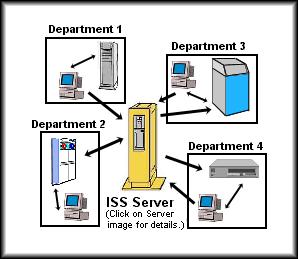
Synchronization
After more than a decade of PC proliferation, redundant databases are now the rule rather than the
exception; and they present a number of problems for the enterprise. The most significant is the lack of incentive among information users to make sure that the "official" version of the data is timely and accurate.
In the past, users would have to update the central repository in order to assure that their own data products were correct. Now they only need to update their own local databases. This has led to an environment in which each
database is only partially correct.
In order to restore a reasonable level of quality for mission-critical data, enterprises have now begun to force consolidation of these databases into a single central repository.
Many attempts to consolidate, however, have met with abject failure for one or more of the following reasons:
- Content. The official central database does not include all
of the information elements needed by the local users.
- Control. Most users require the ability to update their
database to reflect the results of their own business processing, so it is often necessary to allow each user to maintain a separate version of the data which they can continue to control.
- Performance. Frequently local processing activities only
deal with a subset of the population present in central files and local databases consists of a smaller data set that is optimized for local processing. Consolidation may make optimization of these sets for local processing
difficult or impossible.
Rather than force database consolidation, enterprises may choose to establish an nformation sharing environment in which all updates to any of the databases are published, and each database may subscribe to those changes that are relevant to its content. ZONAR Corporation's Information Sharing System (ISS) provides a quick and easy way to establish such an environment.
- Publication of changes may be accomplished without change to the existing database or applications
- ISS provides automatic transformation of local database data elements into enterprise-standard elements (Information Objects) that have the same meaning regardless of their source.
- ISS can directly update local databases as well as provide application program interfaces for custom processing of selected transactions.
- ISS can be implemented immediately. No prior agreement on database content, structure, control, or performance characteristics is necessary. Each database is handled as a separate entity. Through ISS semantic mapping, common information content is identified and made available to all authorized users throughout the enterprise. As a byproduct, an enterprise-wide map of information usage is available as a model for future database and application design.
- Even for organizations committed to database consolidation, information sharing can represent an initial phase in which total information flow can be documented
to assure integrity of the ultimate design.
